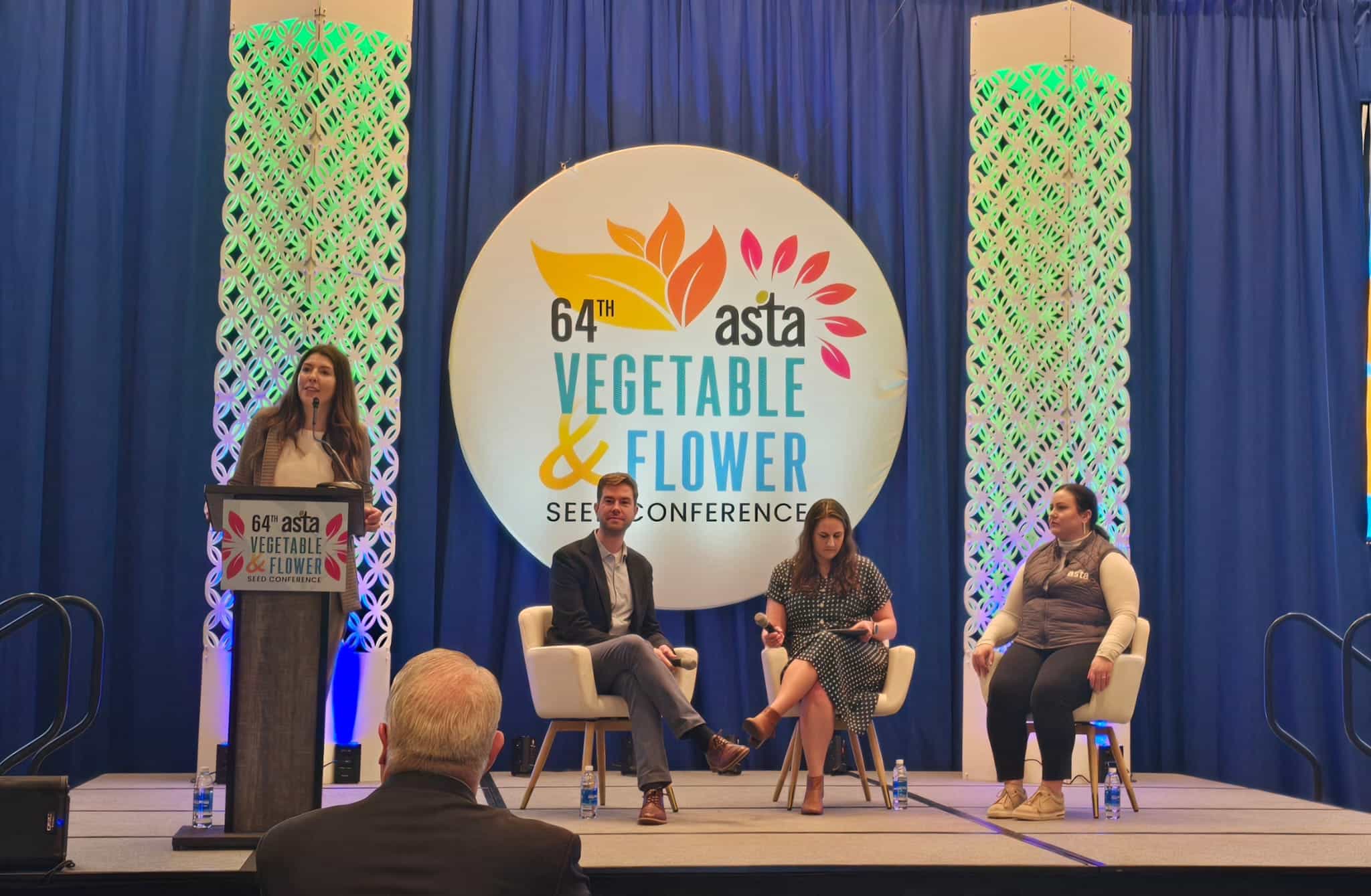Federal and state policies affecting the seed industry were the focus of discussion at the American Seed Trade Association’s (ASTA) Vegetable and Flower Seed Conference.
Hosted by ASTA director of public affairs Payton Englert, speakers addressed ongoing tariff developments, the status of the Farm Bill, and legislative efforts at the state level that could impact seed businesses.
Tariffs and Trade Policy Top of Mind
Recent changes to U.S. trade policy were a major point of discussion. While the Trump administration’s previous tariffs in 2018 followed a structured process with public comment periods and exemptions, the current approach has involved more immediate actions.
“We’re at a pretty dynamic time in U.S. trade policy,” said Sam Crowell, ASTA senior director of international programs and policy. “It seems that a lot of the developments are occurring on the hour level, rather than the weekly level, which is pretty unusual from a trade policy agenda within the first two weeks of an administration.”
The new tariffs, initially set at 25 percent on Canadian and Mexican imports and an additional 10 percent on Chinese goods, were imposed under the International Emergency Economic Protection Authority (IEEPA) rather than through the traditional trade law process. Tariffs on Canada and Mexico were later paused, while the 35 percent tariff rate on Chinese imports remains in place.
“Obviously, when a government puts tariffs on imports coming from another country, that country is entitled to react,” Crowell said. “So at this stage, we’re really in a waiting game to see which of our products will be hit and at what level.”
Industry representatives have raised concerns about potential long-term effects on business operations.
“If our trade policy continues to undermine the ability to operate here in a predictable manner … is it easier, or is it more favorable, for the industry to consider moving seed processing, seed cleaning, seed production facilities elsewhere globally?” Crowell asked.
Crowell also commented on the timing of the recent tariff announcement, which was later paused in some areas.
“I think we’re all asking ourselves that,” Crowell said. “The sense of many people in D.C. is that the administration is testing how everyone is reacting to different actions.”
Still Waiting on a Farm Bill
The Farm Bill was another key issue discussed during the policy update. The bill has been extended twice, and industry representatives are monitoring the legislative process closely.
“If you were here last year, we were discussing the Farm Bill. The year before that, the same Farm Bill. And as we sit here today, we’re discussing that very same Farm Bill,” said Janae Brady, ASTA vice president of government affairs.
Last year, the House Agriculture Committee passed a bipartisan bill, but the Senate did not advance it.
“They dropped a couple of proposals — one Republican framework, one Democratic legislative text — but we never saw a markup or a committee vote to move it forward,” Brady said.
With a new Congress and a Republican-controlled Senate, there may be shifts in legislative priorities. The House is expected to continue working with its previous version, while the Senate will likely reassess its approach.
“ASTA’s focus remains on securing funding for key research programs and ensuring stable regulatory policies for gene editing and other innovations,” Brady said. “The challenge will be where the Farm Bill fits into the broader legislative agenda, with discussions on tax provisions and a potential reconciliation package also in play.”
The timing of further action on the Farm Bill remains unclear.
“We don’t know what’s going to be happening that will take up the oxygen in Congress,” Brady said. “We know that they’re talking about a reconciliation package. We know that they’re talking about extending tax provisions from the previous Trump administration. And where we’re able to fit our Farm Bill conversation into that discussion will be the big question.”
State-Level Legislation and Industry Concerns
At the state level, legislative sessions have been active, with proposals related to seed treatments, intellectual property and land ownership receiving attention.
“The states have come out of the gate sprinting this session. It has been fast and furious since about December,” said Jordan Gregory, ASTA director of state government affairs.
One area of focus has been proposed restrictions on neonicotinoids and other treated seed products.
“We are seeing growing efforts starting in the Northeast, moving to the Midwest to restrict or ban neonicotinoids and other seed treatments based on outdated, debunked science,” Gregory said. “The same playbook is being used across multiple states, pushing an emotional narrative about pollinators and wildlife.”
Right-to-farm laws, which are intended to protect agricultural operations, have also been a topic of discussion. Some proposals include language related to seed saving and selling, which could have implications for intellectual property rights.
“The right-to-farm bills are gaining traction, but some versions include language allowing for the unrestricted saving and selling of seed, which threatens intellectual property rights,” Gregory said. “ASTA is working to educate lawmakers on the importance of protecting seed innovation while still supporting farmers.”
Legislation related to foreign ownership of agricultural land is another area to monitor.
“This remains a hot-button issue in multiple states,” Gregory said. “ASTA is ensuring that when these bills come up, agricultural research remains protected so that seed companies can continue their work without unnecessary restrictions.”
Gregory encouraged industry members to engage in advocacy efforts.
“Make yourself the trusted resource lawmakers turn to. Tell your story—stories resonate far more than policy papers,” Gregory said. “Invite legislators to your facilities. Let them see firsthand what you do. No visit is too big or too small.”
Industry Engagement and Advocacy are Vital
With multiple legislative and regulatory issues developing at both the federal and state levels, ASTA leaders encouraged members to stay involved.
“Everyone in this room has already taken the first step — being involved in ASTA,” Brady said. “We work hard to keep our members informed and to provide outlets for your voices to be heard in Washington and at the state level.”
The upcoming ASTA Leadership Summit in June will provide an opportunity for members to engage with policymakers.
“Given the administration’s trade policies over the past 10 days, we fully anticipate the Leadership Summit being a critical place to talk about international trade issues,” Crowell said. “This is not just a D.C.-focused discussion; it has global implications.”
With discussions on trade, agricultural policy and regulatory developments expected to continue, ASTA leaders emphasized the importance of industry engagement in shaping future policy decisions.













